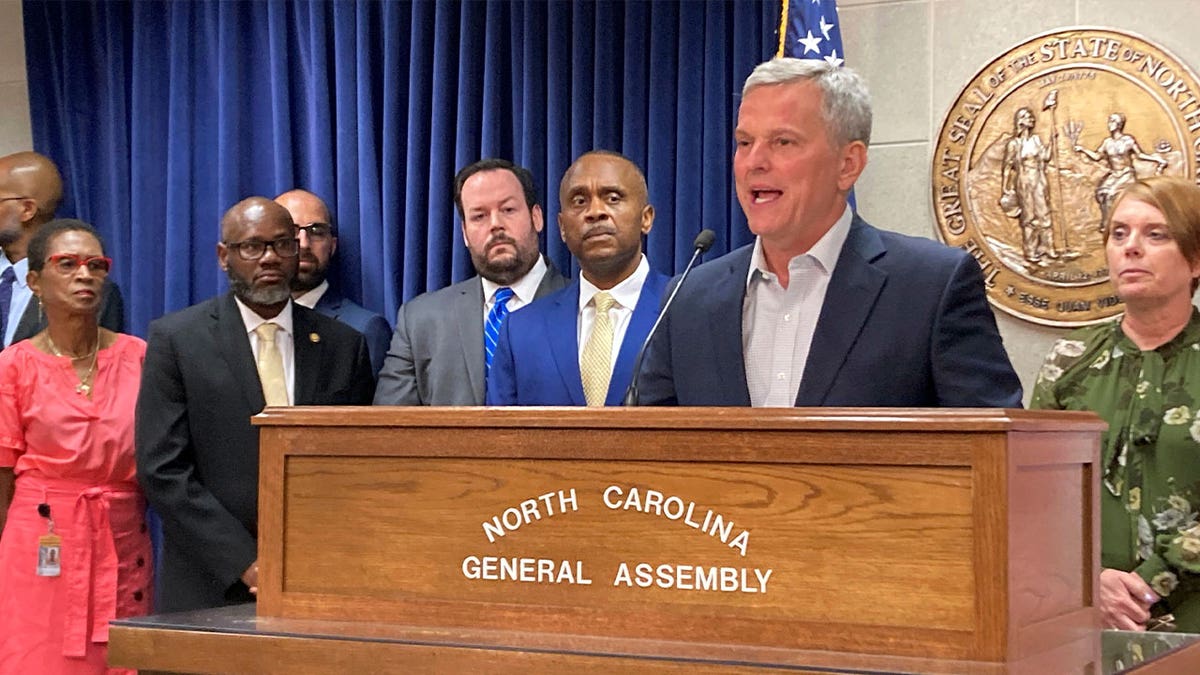Fox News Flash top headlines for July 13
Fox News Flash top headlines are here. Check out what's clicking on Foxnews.com.
With a budget deal already a couple of weeks late, North Carolina Democrats complained on Wednesday that the absence of a state government spending deal by Republicans is delaying the expansion of Medicaid and setting up more obstacles to hire and retain teachers and law enforcement.
2024 gubernatorial candidate and Attorney General Josh Stein joined House Democrats at a Legislative Building news conference to throw shade at GOP leaders who control the General Assembly and the behind-the-scenes budget negotiations for the delay.
With the GOP holding veto-proof majorities in both chambers, current Democratic Gov. Roy Cooper and his allies have few tools at their disposal to influence the final budget product as long as Republicans remain united. So Democrats laid the blame for the wait on Republicans, some of whom suggested later Wednesday that a budget agreement may not get settled until deep in the summer.
UW PRESIDENT WARNS GOP AGAINST BUDGET CUTS; THREATENS CAMPUS CLOSURES, TUITION HIKES
"There's nothing on our side to stop anything from going through for a budget," said House Minority Leader Robert Reives of Chatham County. "But yet we’re still waiting for school personnel to get raises, state employees to get raises, for critical funding for a lot of the needs that we have going on throughout the state."
The House and Senate in the spring approved competing two-year spending measures starting with the fiscal year beginning July 1. House Speaker Tim Moore and Senate leader Phil Berger have said negotiations slowed over the scope of additional tax cuts sought by the two chambers and how some unspent money is earmarked for future use. Talks over permitting non-tribal casinos in the state also could bring delays.
"There are strong positions and strong arguments among the two chambers here, but progress is being made," Moore told colleagues later Wednesday on the House floor.

North Carolina Attorney General Josh Stein speaks at a news conference in Raleigh on July 12, 2013. Stein and other Democrats criticized Republican legislators for failing to approve a two-year state budget before the deadline. (AP Photo/Gary D. Robertson)
Over the years, missing the July 1 budget start date isn't unusual, including when Democrats controlled the General Assembly for much of the 2000s. And state law now keeps agencies operating at base spending levels when negotiations go into overtime, avoiding talk of government shutdowns. In 2019, a conventional two-year budget never got enacted because of a stalemate between Cooper and Berger and Moore when Cooper's budget veto held.
Still, this year’s delay prevents resolution on raises for teachers, making it more difficult to locate educators to fill thousands of teaching positions for this fall, said Rep. Julie von Haefen, a Wake County Democrat.
"Our children need teachers and yet Republican leadership cannot help our (school) districts hire because they don’t know how much they can offer these teachers to be paid," von Haefen said.
MAINE LEGISLATURE APPROVES BUDGET ADDENDUM THAT INCLUDES 12-WEEK PAID FAMILY LEAVE PROGRAM
GOP Rep. Jason Saine of Lincoln County, one of the chief budget negotiators, called the Democrats’ critique "political grandstanding" that’s expected from a minority party that he said won’t like whatever budget is hammered out.
"To get to a good agreement, sometimes it’s better to wait ... this is really more about us being very pragmatic and working through a very complicated multibillion-dollar budget that sets our state on course," Saine said. With planned vacations and other summer travel by lawmakers, Saine predicted a final budget may not get done until mid-August.
Berger spokesperson Lauren Horsch wrote in an email late Wednesday that "the Senate and House continue to have productive negotiations and we look forward to finalizing the budget as soon as possible."
CLICK HERE TO GET THE FOX NEWS APP
Stein, a state senator before being elected AG in 2016, urged lawmakers to act and spend more on efforts to recruit police officers and sheriffs’ deputies and keep them on the force. While some of the ideas he’s promoted are advancing, Stein said, the House and Senate budget proposals don’t "do nearly enough to address the real challenges that I hear about from law enforcement on a regular basis."
And there's another rub to the budget's passage this year. The bipartisan law that Cooper signed in March directing North Carolina to accept the federal government's Medicaid coverage to hundreds of thousands of low-income adults requires a budget law to be enacted before it can't be implemented.
Cooper said last week the expansion delay is resulting in state government and hospitals waiting longer on federal funds and traditional Medicaid recipients losing access to coverage because they now make too much money to qualify.
Reives repeated Cooper's demand that lawmakers formally delete the requirement of the budget's passage for expansion to occur — something Republicans aren't about to do.













































